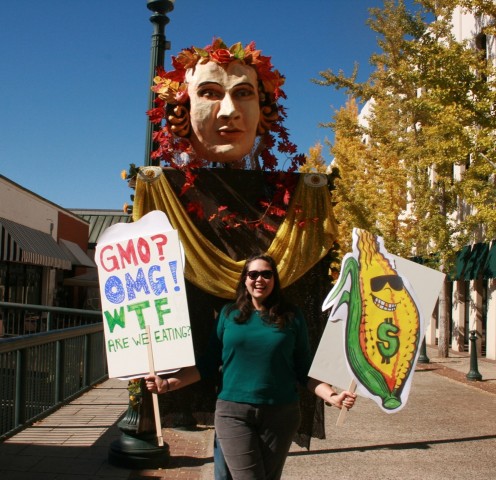In her essay on the hazards attending genetic engineering, “A Fist in the Eye of God,” author Barbara Kingsolver raises the question: “What will it mean for a handful of agribusinesses to control the world’s ever-narrowing seed banks?”
For some organic and family-farm operations, that question has recently come into sharp focus. In a class-action lawsuit intended to protect them from legal attacks by the agricultural giant and brought to federal court in New York, a group of small agricultural producers took on Monsanto. The company is the world’s largest manufacturer of conventional and genetically modified seeds. In the suit, the complainants were attempting to get its agricultural patents invalidated, according to a New York Times report. The judge dismissed the case on Feb. 24, but growers and locals like Carol Koury, owner of Asheville’s Sow True Seed, vow to keep fighting. She is organizing a petition drive to build local support and awareness about the issue.
Back in January, Koury and Sow True staffer Cathryn Zommer joined some 82 other farmers, advocacy groups and seed companies as part of the class-action lawsuit against Monsanto in federal court last spring. Led by the Organic Seed Growers and Trade Association, the complainants petitioned the court to prevent Monsanto from suing association members for patent infringement when its genetically modified plants turn up on group members’ farms.
“Unlabeled and untested, pollen drifting from genetically engineered crops is a threat to the integrity of organic and non-genetically modified crops,” says Koury. “This is in direct conflict with our right to produce and consume pure, natural food.” Sow True Seed produces and markets heirloom plant varieties that have stood the test of time in decades of gardens, free from the problems presented by many hybrid varieties, which don’t “breed true” or maintain their desired characteristics in successive generations.
In recent years, Monsanto has successfully sued scores of smaller growers, arguing the latter have stolen the patented plant varieties without payment. Meanwhile, the growers complain that airborne pollen from their neighbors’ genetically modified plants has contaminated their crops, endangering their status as certified organic and GMO-free.
What’s at stake, say Koury and others involved in the lawsuit, is the ability to provide high-quality, open-pollinated and heirloom produce and seeds. The complainants in the class-action suit argue that in the past two decades, the seed monopoly staked out by Monsanto has grown so powerful that the company controls the genetics of nearly 90 percent of five major commodity crops: corn, soybeans, cotton, canola and sugar beets. The result is increased costs to farmers in support of high-tech patent fees for seed, as well as burdensome litigation costs incurred in defending themselves against lawsuits brought against farmers and independent growers by Monsanto, which has reportedly sent private investigators to farms suspected of replanting saved seed rather than buying fresh seed from the company.
The complainants further allege that many organic and conventional farmers have been forced to stop growing certain crops in order to avoid genetic contamination and potential lawsuits. Between 1997 and 2010, they say, Monsanto filed 144 lawsuits against farmers in at least 27 different states, for alleged infringement of its transgenic seed patents; another 700 such cases have been settled out of court for undisclosed amounts, the farmers bound to confidentiality. As a result of the aggressive lawsuits, the growers say, Monsanto has created an atmosphere of fear and driven many farmers into bankruptcy.
The complainants fault not only Monsanto but also the Food and Drug Administration, which regulates labeling. The FDA has thus far accepted Monsanto’s claim that genetically modified crops are “substantially equivalent” to traditional products, with the result that they need do not require pre-market safety testing, and need not be labeled. Thus, consumers can’t know what foods have been grown using genetically engineered crops.
On February 24, a federal judge granted Monsanto’s motion to dismiss the case. Attorney for the small growers, Daniel B. Ravicher, noted in a statement: “While I have great respect for Judge Buchwald, her decision to deny farmers the right to seek legal protection from one of the world’s foremost patent bullies is gravely disappointing.”
In describing the case to Xpress prior to her trip to New York, Koury acknowledged another hurdle in the fight: The current deputy commissioner of the FDA, Michael R. Taylor, is a former vice president of Monsanto. The corporation has enjoyed support throughout government and the legal community, growers say. That support extends all the way to the Supreme Court, the trade group says: Supreme Court Justice Clarence Thomas served as an attorney for Monsanto in the late 1970s and has failed to recuse himself from other cases involving the corporation.
To bring their message home in Asheville, Koury says Sow True Seed has launched a petition drive that seeks to establish an agricultural conservation zone in Western North Carolina, free from genetically modified crops. “Sow True Seed is working aggressively to collect signatures for our GMO-Free WNC petition,” says Zommer, adding that they’ve recently found an attentive ear with Rep. Patsy Keever and Asheville City Councilman Gordon Smith.
Says Koury, “The petition gives a voice to the overwhelming majority of people who support mandatory labeling of genetically modified ingredients in our food.”
Readers can sign the petition online or in person by visiting the Sow True Seed warehouse at 146 Church Street.



I am afraid it is over. Thrown out of court without any effort. Only people winning are the lawyers. It was a foolish suit to bring